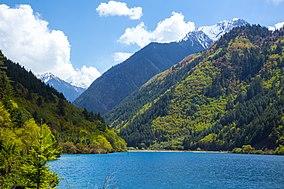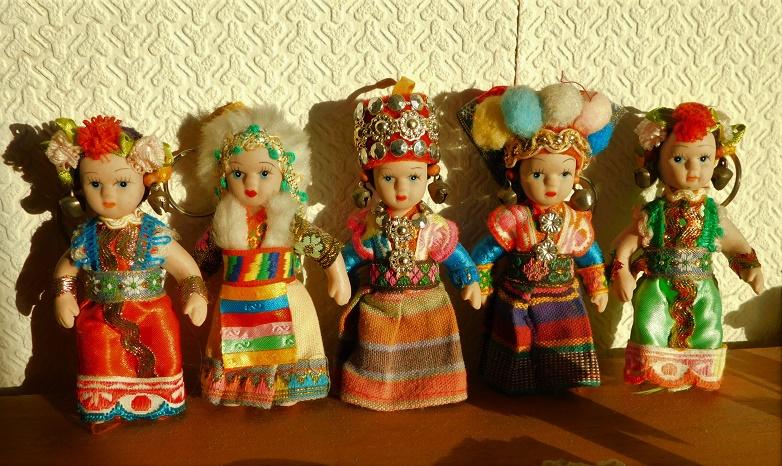English how about just conversation?
Joe Biden´s inauguration ceremony was very impressing., indeed, and so different from the one of his predecessor who is now facing wonderful times on Florida´s fines golf courses..
I´m happy Trump is no longer president., no longer the world´s most powerful man.
I wonder if you would love to read some chapters of my China travellog.
November 8th to 13th
Arriving at Chongqing
The train comes from Jinan. Going from Luoyang to Chongqing takes all night, all morning and half
the afternoon. I can relax well on the hard sleeper. There is a clean sheet, a warm quilt and a soft pillow. Under the pillow I find a nice towel. The towel looks rather new. As someone obviously has forgotten it here, I put it in my bag, maybe I can use it on my trip. In the early morning hours, I can see steep high mountain slopes on both sides. The railway line is winding its way high up along the slopes and running through countless tunnels. From time to time there is a station with half a dozen houses, whose roofs are covered with layers of slates. The line is one track only. So at each station the train stops for a long time to let the oncoming trains pass. Most are goods trains. I can see sunshine on the mountains and fog below. When the train is getting into the Sichuan basin, there is a lot more fog, which slowly dissipates. The average speed must be very low. At last we are approaching Chongqing. The guard gives me back my ticket. Then he makes the beds. This takes some time. But when he makes my bed, he suddenly looks at me and tells me that something is missing. At least I guess from his gestures that this is what he wants to say. He looks under the pillow, under the quilt, then points to the other beds, and what do I see?! On all the pillows there is a towel, except on the bed where I slept. I understand. My face becomes red. I feel embarrassed. I open my bag, and have no trouble finding the missing towel. I hand it back to the guard and don´t want to look in his eyes. I am so much ashamed.
My friend Wanghua is waiting for me at the huge North Chongqing railway station. He is a young man, about 34 years old, a university assistant. We have communicated many times online about linguistic questions. He is collecting faulty English tourist information which he will use as samples in his thesis. First of all he leads me to a bus which takes fifty minutes from the station to near his home. There are so many passengers. We must stand all the way, which is no problem as I have been seated or lying down all night, and many hours today. He lives near Sha Ping Ba, a modern part of Chongqing with lots of high rises, lovely shopping streets, supermarkets, monuments, restaurants, trees, benches to sit down, and almost no cars. His home is quite different. He lives on the ground floor, where he has rented three or four rooms of which he uses one for himself, the others are let to other people. Outside the 10 story building is all black, built in the 1960s or earlier. There are solid iron bars and wire netting in front of each window, even on the upper floors. The window panes at the entrance have nice tainted glass pictures. There are several of these buildings here. Wanghua tells me they were built as cheap homes for the railway employees and their families. At the entrance we take off our shoes. I am given a pair of slippers. I am lucky one of the rooms is empty at the moment. I can sleep here. The room is rather small. My friend tells me that I should not leave anything near the window and always keep it closed, as at night there might be someone trying with a long stick to get at the things inside. As I have been travelling for a week now, I need to do some washing. I can do it in the bathroom, hanging the wet clothes onto hooks in the room where I am going to sleep tonight. After that we go to Sha Ping Ba, the modern part, again. Wanghua meets his girlfriend and a colleague. They show me the modern part. We go to an underground supermarket with lots of interesting foods, especially fish. In this modern part of Chongqing, I can see lots of pretty girls clad in the latest fashion. My friends tell me that this city is famous for having the prettiest girls. Many of these are wearing short fancy dresses, black tights with intriguing designs, and boots. Another group of people are the strong men who offer their service for carrying people´s heavy parcels, bags or shopping. These men are waiting at street corners for customers. They have a thick bamboo stick about a meter long, with strings. When they are called, they bind the strings to the heavy loads and put the bamboo stick on their shoulder.
Udo Dear
I loved reading about your journey to China.
I ws looking for a year when you went. 1954 you went to Englnad. what year was it when you travelled China. I looked up the big Chongqing. There are some lovely things tehre to see.
I found this
Chongqing ist eine weitläufige Stadt am Zusammenfluss von Jangtsekiang (kurz Jangtse) und Jialing im Südwesten Chinas. Im Stadtzentrum erhebt sich die große Volkshalle mit einer Kuppel über dem Platz des Volkes, der eine Fußgängerzone ist. Auf der anderen Seite des Platzes befindet sich das Drei-Schluchten-Museum mit Artefakten vom Bau des Drei-Schluchten-Damms sowie antiker Kunst.
When I was young I read books from Pearl S. Buck. The first book I read was The good earth.
I love to read more over you experience in China dear Udo.
Greetings and böess you
Yoli
Chongqing is one of the world´s biggest cities.. I think I went there in 2007, not sure. I visited many places in China and from Chongqing I took the plane for Zhuzaigo, which is a very very beautiful nature reserve in China. whith hundreds of waterfalls.
Apart from my wife, you are the only one who ever showed any interest in reading about my experiences in China.
So I am adding one more chapter aboout Chongqing.
---
When we feel a little tired we sit down on a bench under one of the trees. Some beggars pass by, hoping for a yuan or more. One of the beggars obviously is from Xinjiang Province. His nose is long and curbed, and he is sporting a long white beard. Perhaps he belongs to the Uygur minority people. Then a shoecleaner comes and asks if she can shine my shoes. I agree. She sits down on a very low stool, and I must set my feet with the shoe against a rest of her box. While working fast and professionally, she looks furtively right and left, afraid of being caught and fined by a policeman, as this kind of work is not allowed in this pedestrian area of modern Chongqing. However she must earn money for her family. She gets one yuan for her work. My shoes are really shining as if recently bought.
Finally it is time for dinner. My friends take me to a small restaurant, where Wanghua wants to try the typical Chongqing food, hot pot, which is famous all over China. The hot pot is prepared at the table. First a metal stand is put on the table, with an inflammable substance. When the flame is lit a pot is put on it. This pot is divided into two parts, the inner one with a soup which is less spicy, and the outer part with another soup which is really very very spicy. Then different ingredients are brought to the table: mushrooms, pig´s stomach, vegetables, lotus root, slices of radish, bacon, etc. These are put in either of the two chambers of the pot which is now boiling hot. After some minutes when they are ready, the ingredients are taken out and eaten. My friends wonder whether I can eat such spicy food. They tell me, most foreigners can´t. At least at the beginning. But after some weeks in Chongqing they think really spicy is wonderful. I am trying. After only seconds after the first mouthful my nose starts running, my throat is burning, I cannot help but cough, I must drink lots of ... well, hot tea. So I am only eating the delicacies boiled in the less spicy soup.
The Jiuzhaigou valley is part of the Min Mountains on the edge of the Tibetan Plateau and stretches over 72,000 hectares (180,000 acres). It is known for its many multi-level waterfalls, colorful lakes, and snow-capped peaks. Its elevation ranges from 2,000 to 4,500 metres (6,600 to 14,800 ft). 
HI Udo
you send me on a journey to China. Have alook at that foto I found. Could even be Switzerland.
Now I will read the rest of your tale. You write and I feel as if I was there as well. Great!
hopefully you don´t mind getting and reading more chapters of my trip to China some years ago. Jiuzhaigo is a most breathtaking valley inhabited mostly by Tibetan people.
.However I doubt my adventures in those areas are of any interest in this thread .what about just conversation?
Maybe other users will object.
Anyway I am going to send another chapter telling about my experiences in Sechuan.
jacaré4
 Keyring dolls from Jiuzhaigo
Keyring dolls from Jiuzhaigo Visiting Ci Qi Kou
After this wonderful local meal, Wanhua and his girlfriend accompany me back home, where they sleep in one room, whereas I am having a good night´s rest in the now empty room. The next day Wanghua has promised to show me round one of the famous tourist areas of Chongqing, called Ci Qi Kou. It is about 14 km northeast of the city center, on the Jialing River, which flows into the Chang Jiang, the famous Yangtze (Yangzi). The air is full of mist, or fog, or smog. Even during the best hours of the day, no sunshine can penetrate to the people in Chongqing. Wanghua takes me to the river, where there are some restaurant ships securely moored to the bank by long metal ropes. The water of the river is low. Not far from the bank I can see two or three fishing boats. Although they are not more than two or three hundred meters away from us, they can hardly be seen in the fog. Chongqing is also called fog city. By the way, Chongqing is one of four so-called municipalities in China, the other three being Beijing, Shanghai and Tian Jin. These are not regarded as provinces. But what are they? Is it that a municipality has got the name of its main city? I have not found out, maybe it is just a definition of a special kind of administration. Anyway, Chongqing is the biggest of the four municipalities, with about 82 000 square kilometers, which is almost a big as Austria, and with more than 30 million people living there. However the densely populated city area of Chongqing has only about 5 million people with another three or four million living in the suburbs. The city is built on hills so it is an area without the typical omnipresent bicycles. But as Chinese are getting more and more affluent bicycles are disappearing in most other cities, too. Most tourists coming to Chongqing stop here for getting on one of the cruise ships travelling on the famous three gorges stretch of the big Chang Jiang. The Yangzi is over 6300 km long. It is the longest river in China, the longest in Asia, and the third longest worldwide. Its source is in Qinghai, which is part of the Tibetan tableland.
Ci Qi Kou is a nice place for visiting. The houses are low buildings in the older Chinese style. Most of them have shops with a good choice of things to buy: souvenirs, lovely vases, toys, snacks, rugs, knitware, carved wooden figures, music, cassettes recalling the speeches held by chairman Mao during the cultural revolution, paintings showing the three gorges area, etc. Above the shopping street, on the slope, still a little difficult to see clearly in the mist, I discern a pagoda which is one of several temple buildings. Temples seem to be of little importance in the modern parts of Chinese cities. 60 years of communist government apparently had the effect that people are more interested in shopping in supermodern department stores and all kinds of consumerism than in religion. In the modern parts of Chongqing no new temples are being built. On the other hand, many elderly people, and lots of young people use the chance for praying if they find a temple. Many guided tours, I should even say pilgrimages, are made to the famous temple mountains, such as Emei Shan, Le Shan, Tai Shan, etc.
Walking along the streets in Ci Qi Kou is good fun. The feeling is that of leisure. The houses are all in good condition, clean, modernized in recent years, probably for attracting tourists. Street cleaners are collecting the rubbish. There are lots of small dogs in the streets. People here seem to love dogs. But everything is very touristic, except at the far end, where the local people, mostly elderly, are chatting in the streets and seem to live peacefully. Living here must be very relaxing, not too hectic. I wonder where all the people are being resettled that had to leave their homes because of the gigantic dam which stops the impetuous flow of the Yangzi, and which caused the Three Gorges, once a very dangerous part of the Yangzi river to be a quiet lake, hundreds of kilometers long. The scenery is certainly still very rugged and impressing. As the water has been stowed, its level has risen by at least 100 meters, thus flooding lots of villages and even cities. More than a million people had to leave their homes. Where do they live now? What about their businesses, their neighbourhoods, their families, friends, ancestors´ tombs, memories? Have they been given new homes, fields, gardens? I doubt there are any free areas available that can be turned into agricultural land. China is so densely populated already. And the less populated areas: Western Sichuan, Gansu, Qinghai, Tibet and Xinjiang are mostly deserts or highlands where only few people can live from the crops harvested in their fields.

Apart from my wife, you are the only one who ever showed any interest in reading about my experiences in China.
Dear Udo,
I had to laugh when reading your above sentence You might like to hear that I also enjoy reading your travel log. You definitely have descriptive and narrative talents. Really a pleasure to read!
Looking forward to further chapters -
Best wishes
Virginia
@Virginia
Dear Virginia, it´s true, from my family only my wife read my report about travelling in China. Maybe she did so because she wanted to show how much she loves me. My children and grandchildren did not show any interest.
I suppose here are some interested users. So I will continue with more chapters.This time I will tell about the flight from Chongqing to Jiuzhaigou. The flight really was something very special. When remembering it I still can feel how scary it was.
jacaré4/Udo






